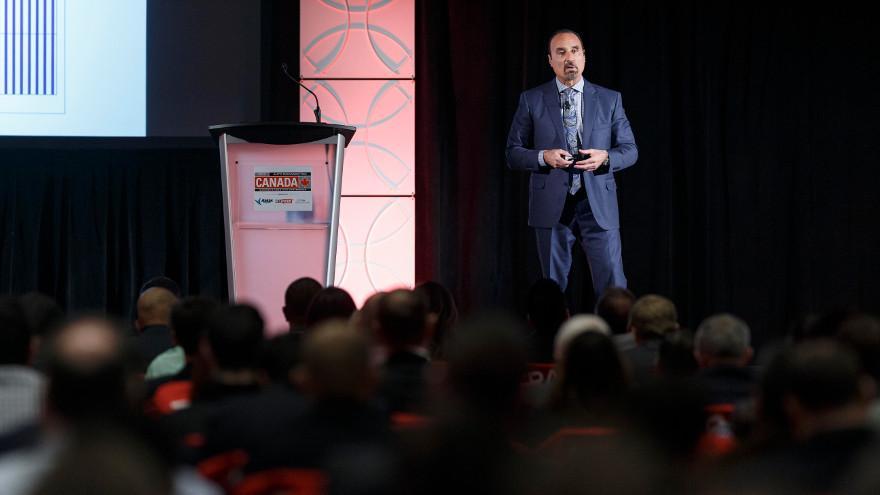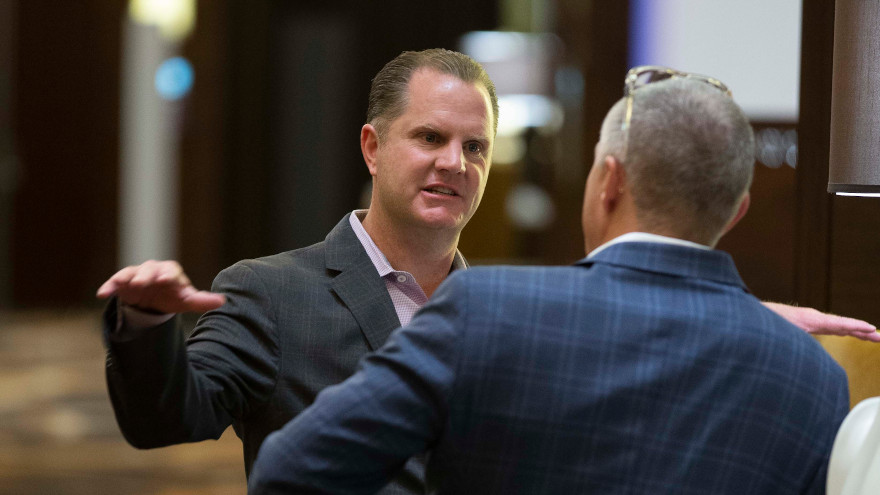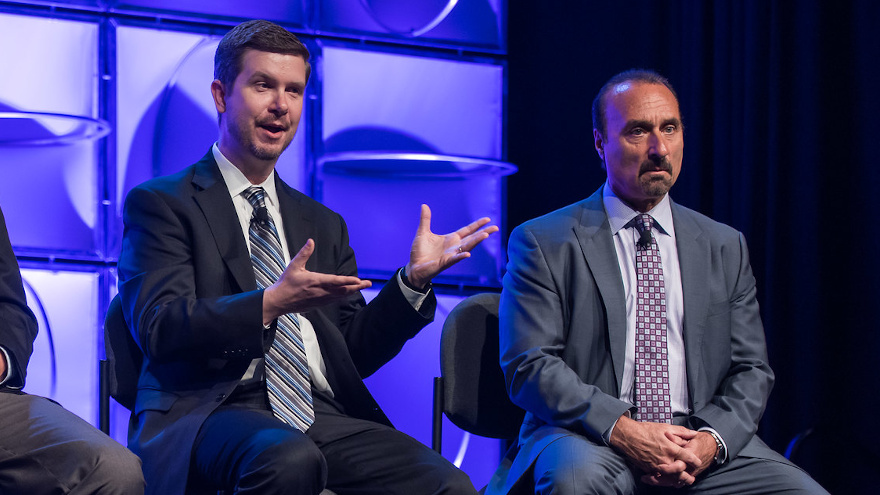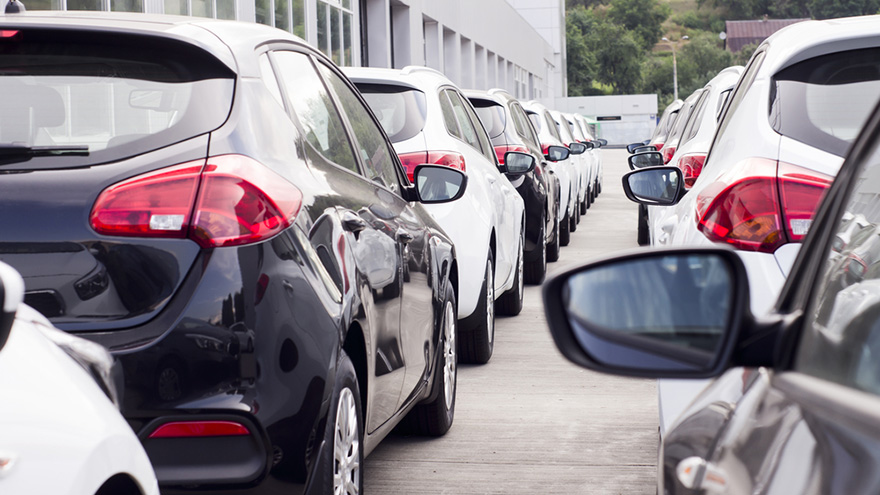In a nutshell, the vehicles are in the wholesale auction supply pipeline, but there isn't a big appetite for buying (or maybe even selling) right now.
That is one takeaways from Auto Remarketing's ongoing analysis of wholesale and retail used-vehicle data and COVID-19 impacts being tracked by the likes of J.D. Power, Cox Automotive, KAR Global and others.
In auction supply parlance, Cox Automotive describes vehicles being added to wholesale inventory as being a “check-in.”
This time of year, those usually climb. Not the case this year. But as the company’s chief economist Jonathan Smoke explained in a quarterly call Tuesday, there is still a significant amount of “sellable commercial inventory” at Manheim auctions.
“This is typically a very busy time of the year for inventory increases, because sellers are trying to line up with the biggest demand for the year. So, we’ve actually been seeing check-ins down dramatically, virtually every week,” Smoke said.
The opening week of the crisis, there was a major “influx” of rental-risk vehicles moving into the supply. Otherwise, check-ins have been down, with Smoke describing them as “down substantially on a year-over-year basis.”
But with not as many cars being sold, inventory at auctions is still climbing.
“As of last week, we measure sellable commercial inventory, which is the thing that tends to build and then takes time to sell off, up 33% on a year-over-year basis,” Smoke said, referring to the week that began March 30. “But we’re not yet at the stage of needing to buy land to find places to park vehicles.
“We’re not quite at the level that the market was back in 2016, where we had the first part of the off-lease major growth hitting the market when the market was a little bit down in terms of demand on the retail side,” he said. “So, you had a lot more sellable inventory back then and more pricing pressure.”
Again, with a sales decline and the fact that check-ins are still happening (despite being “down dramatically,”), “it means inventory is growing week to week,” Smoke said.
He later explained that with retail consumers showing “relatively strong” levels of shopping and interest in vehicles, “we continue to be hopeful that there will be pent-up demand that comes back into the market and helps to erase some of that inventory. But I think realistically, we’re not expecting retail — of either new or used — to be recovered by the time we reach the end of the year.” due to job losses and disruption to the economy, he said.
Providing some more historical context, Smoke later added: “All in all, it’s not an unprecedented level of inventory, and it’s one with some recovery in sales, I think the hangover in the market will be a lot less severe than people are fearing at this point.”
Wholesale transaction volume declines are approaching 80%, Smoke said. But he doesn’t see this as “desperation.”
“The way that I take a step back and look at this market, is that essentially, both buyers and sellers are in pause mode,” he said.
'A lot of cars we would have normally sold'
Over at KAR Global, ADESA Simulcast had a 58% gain in unique bidders (compared to the prior six-week average) the week of March 16, with simulcast bids climbing 115%. But total auction sales volume was down 39.2%.
Likewise, total upstream sales volume was down 35.9%.
Auto Remarketing connected with KAR chief economist Tom Kontos, who provided some additional context into wholesale supply and volume, among other areas.
He certainly sees the volume impact of the pandemic different from that of the aftermath of Sept. 11, 2001.
“From a volume perspective, one way I distinguish this period from 9/11 was we have already dealt with the surge in off-lease volume. That's already happened, so at least we don't have that,” Kontos said. “But there are a lot of cars that we would have normally sold.
“We have optics into the upstream space better than anybody else because we host so many of the upstream, private-label sites,” he explained. “If things were running normal, we would be selling those cars upstream, or if they didn't sell upstream, we send them to our auctions and they would be at next week's sale, clearing that inventory.”
Many cars that are running upstream are getting no-saled due to short demand and many dealers forced into “locked-down mode.”
“One thing we did not stop doing once we suspended operations was posting cars on the upstream sites,” Kontos said, referring to the roughly two-week stoppage of sales at ADESA locations that ended in early April. “We were still 'selling' cars but the percentage of listings that are being sold right now is way down. Normally it would be well above 50% of the cars that are offered upstream get sold upstream. Now it's well below I would say 20%.”
Dealers will not simply be able to hold on to those cars “forever,” so plans are being made to have them transported to ADESA locations.
“We do see a limited surge of off-lease volume that will come when we start back up again because of the backlog of no-sales in the upstream channels,” Kontos said.
He would also delve into the intricate “dynamics” of repossession, trade-in and off-rental volumes, and noted that off-rental is one where a supply “surge” is more apt to happen.
“I would say the off-rental is the one more likely to surge because the rental car companies don't have a lot of cars being rented right now,” Kontos said. “So, all of those cars are sitting on their lots instead of being out and about. They have to get rid of them otherwise they just have way too many cars sitting around.
“Spring break really never happened. That is a time of year when they keep a fair amount of vehicles in inventory and they have them out rented while people are on spring break. We just don't have the happening right now,” he said. “Normally they would stay in service another six weeks perhaps, but now they're going to be coming right back as soon as we can open the gate.”
J.D. Power sees sluggish auction activity
Wholesale auction sales volume of vehicles up to 8 years old was down 37% week-over-week during the week ending April 5, falling to 14,700 units, according to a report released Friday by J.D. Power Valuation Services.
And before the virus, the weekly average for that week was around 113,000 units sold at auction.
“Note that under normal circumstances, weekly volume in California alone is similar to the volume we recorded for the entire U.S. last week,” J.D. Power analysts said in the report.
Stay-at-home orders increased during the week of April 5, bringing “physical sales to a virtual halt,” the company said.
“At the state level, the more stringent stay-at-home measures enacted in Florida during the week ending April 5 pushed auction volume down 60% in the state, the steepest relative decline among major states,” J.D. Power reported.
“While down dramatically from pre-outbreak levels, auction activity was highest in the Mid-Atlantic, Texas, and Desert Southwest,” the company said, referring with the latter to states like Arizona and Nevada. “Volume losses across segments continue to be consistent across the board, reflecting the overall industry average.”
By segment, many week-over-week auction sales volume declines the week of April 5 were in the 30-40% range, with a few going north of 40%, the J.D. Power data shows.
Midsize vans were down 43% in auction sales volume, small cars were down 42% and compact premium SUVs were down 41%.
Of the segments listed by J.D. Power, only large SUVs (down 24%) and midsize premium SUVs (down 26%) had declines less than 30% the week of April 5.
Auction sales volume in March was at 283,000 units, down 31% month-over-month and close to 40% year-over-year, according to J.D. Power.
In discussing the new surface disinfection and air cleanse services from mobile vehicle care and fleet services company RideKleen, Pratik Patel said that in the current COVID-19 situation, companies should have taken a more proactive approach in cleaning vehicles, rather than reactive.
“If we had a more of a proactive approach when it comes to cleaning vehicles, this may have been a little bit easier problem to solve,” said Patel, who is president of RideKleen, in an interview with Auto Remarketing.
In response to the pandemic, RideKleen, a Cox Automotive brand, will implement its heightened Surface Disinfection & Air Cleanse Services in partnership with Cox Automotive brands Clutch Technologies and Manheim to bring a new retail delivery and service pickup and delivery offering. The company also announced new cleaning and disinfecting products.
Patel said the company accelerated the product offering because of the COVID-19 outbreak, but he noted it will be a permanent capability after the subsiding of the outbreak.
RideKleen says it can now treat vehicles with an EPA-approved, hospital-grade disinfectant called DetraPel, which states that it is designed to kill 99.9% of bacteria and viruses, including Coronavirus.
RideKleen says it will also begin treating in-vehicle air with a hygienic vapor called NuVinAir and its patented ReStore and ReFresh process. The company says the product can help remove contaminants, odor and pollutants “and reach places sprays and wipes cannot.”
In addition to offering the service to Cox Automotive clients, RideKleen is working on developing various charitable partnerships to help disinfect the vehicles of medical professionals and first responders who are fighting against COVID-19. The company said it will begin complimentary vehicle disinfection services for Middletown Township Police Department just outside Philadelphia.
Patel told Auto Remarketing that RideKleen, a Cox Automotive brand, was rolling out the Surface Disinfection & Air Cleanse Services in the Atlanta market on April 6, but he said the company was looking to offer the service to people across the country.
“We’re going to partner with Clutch Technologies and also Manheim locations to be able to bring them the solution, and then they can also deliver it to some of the partners that they work with,” Patel said.
Dealers using the Clutch Technologies Retail Delivery & Service Pickup and Delivery platform will have access to RideKleen’s Surface Disinfection & Air Cleanse Services. The company said that to help perform some of those services, it will use local Manheim staff and drivers. RideKleen sourced the 2020 Cox Automotive COVID-19 Dealer Impact Study in noting that 44% of dealers said they are requiring more frequent sanitation of test drive vehicles. Thirty-eight percent of dealers are offering test drives at consumers’ homes during the Coronavirus crisis, according to the study.
Expanding on NuVinAir, Patel said to think of it as a hygienic vapor that is released into the vehicle’s interior cabin.
“And the process around that is you would turn the vehicle on [and] run the air conditioner unit,” he said.
He continued, “So that way it can get into the ventilation system for the vehicle as well.”
Patel said disinfecting of vehicles would become an important issue, particularly in the area of ridesharing.
“That trust factor of ‘is this vehicle really safe to get into’ is always going to be in the back of people's mind,” Patel said.
Patel said the company is looking at technology that could work as an automated system. It would work when a vehicle is in down time, and the system could disinfect the vehicle when it is unoccupied.
“So we are working on some really cool things to innovate, because the reality of this is that instead of being reactive, I think we need to start thinking more proactive when it comes to disinfecting vehicles.”
Cherokee Media Group president Bill Zadeits returns to his broadcasting roots for the latest episode of the Auto Remarketing Pocast, where he talks with Troy Blackwell, chief operating officer of NuVinAir.
NuVinAir, whose services are "more relevant today than ever," Blackwell said, has patented technology initially designed to cut vehicle odors, but that has since pivoted to removal of pollutants and contaminants inside vehicles.
Learn more about this technology and how Blackwell, whose background includes time with CarMax as well as leading the AutoNation USA used-car store brand extension, got into auto retail and, later, the vendor side of the business.
To listen to this episode, click on the link available below, or visit the Auto Remarketing Podcast page.
Download and subscribe to the Auto Remarketing Podcast on iTunes or on Google Play.
Experts from Black Book, Cox Automotive, J.D. Power Valuation Services and KAR Global are all using their collective knowledge and skills to assess current wholesale values that have dropped significantly because of the coronavirus pandemic.
These same firms also are tackling the challenge of projecting when wholesale prices might rebound, often using the term “several months” instead of any specific timeframe as stay-at-home orders remain in place throughout many locations.
“When you look at this market, essentially buyers and sellers are in pause mode,” Cox Automotive chief economist Jonathan Smoke said on Tuesday during the company’s quarterly call to examine the Manheim Used Vehicle Value Index among other industry trends.
“You don’t see a lot of evidence of desperation. Instead, you see evidence of buyers looking for opportunities but in essence the spread between the bid and the ask,” Smoke continued. “At the end of the day, only the vehicles that sellers — be they dealers or commercial companies — are prioritizing to move. Those are the only transactions that are happening.”
More details from Manheim
Because change happened so rapidly in March, the latest index reading still looked rosy on a year-over-year comparison.
Cox Automotive reported that wholesale used vehicle prices (on a mix-, mileage-, and seasonally adjusted basis) decreased 1.10% month-over-month in March. This brought the Manheim Used Vehicle Value Index to 141.9, which still represented a 4.4% increase from a year ago.
After a start of increases in weekly Manheim Market Report (MMR) prices at the end of February, Cox Automotive acknowledged that March saw the full-fledged start of tax refund season, which delivered the biggest weekly price increases since 2014. However, that all began to change as the month progressed.
Analysts determined 3-year-old vehicle values in aggregate were up 1.7% after the first two weeks but began to decline and ended up 1% for the month. The worst-performing model year in March since the downturn began was 2019, according to Cox Automotive.
“It should be noted that, given the unprecedented downturn in sales and market disruption that the industry is experiencing because of the COVID-19 pandemic, the decline we have observed thus far in MMR values at the vehicle level and at all aggregation levels does not fully reflect the declines occurring in the relatively limited number of sales transactions taking place,” Cox Automotive analysts said in the report that accompanied the latest index update.
Turning back to the Tuesday conference call, Smoke reiterated a future projection, assuming that the general economy remains in shutdown mode for the remainder of April before a gradual reopening process begins in May.
“I think there is going to be pressure on prices for at least several months through the middle part of the year and then potentially we start to see that pressure relieve as we get into the end of the year and into next year. That’s following the most likely case to occur,” Smoke said.
“The more negative case where we don’t actually see the pandemic reaching a declining stage, that view is much uglier,” he added.
Insight from KAR Global
Auto Remarketing also connected with KAR Global chief economist Tom Kontos on Tuesday. Kontos shared an array of insights, explaining that he looked back at wholesale data available before and after the 9/11 tragedy to generate some perspective about what’s happening in connection with COVID-19.
Kontos recapped that wholesale prices stayed in a soft pattern for about 20 months in connection with 9/11. However, Kontos pointed out that an additional drag on prices 19 years ago was the volume of off-lease vehicles going down the lanes. Nowadays, Kontos doesn’t see off-lease volume being a price impediment.
“It was about 20 months of a downturn in prices around 9/11,” Kontos said. “Now 9/11 didn't trigger all of that and neither did the recession that occurred about the time 9/11. I had almost forgotten that 9/11 didn’t trigger the recession. There was already a recession happening that started in March 2001. Then it ended in November 2001. So in essence, 9/11 didn't do what this tragic situation is doing, namely putting a shutdown on the entire economy. Back in 9/11, we got back on our feet relatively quickly. It's a testimony to that because that recession ended in November.”
Fast forward to now, Kontos shared pricing data he compiled that compared the figure spotted as of the week of March 16 and compared it to the average seen during the previous six weeks. The comparison generated a decline of 10.6% as the average wholesale price dropped from $17,019 to $15,215.
That price drop came even as KAR Global deployed a multi-channel digital dealer recruitment and engagement campaign that led to record levels of Simulcast bidders and bids.
Again as of March 16, Kontos reported that unique bidders increased 58% over the previous six-week average and bids more than doubled, up 115%. Despite high online participation, dealer demand weakened significantly, with total commercial sales volumes decreasing 39.2% and corresponding drops in conversion (down 24.5%).
And now, perhaps the multi-million-dollar question: When will prices rebound?
“What we’re faced with right now, I’m advising our sellers at auction is you can expect prices to stay way down from where they were pre-pandemic. Unless you want to wait it out another several months, I won’t say 10 or 20, but several months, maybe the rest of this year before we see an uptick in wholesale values,” Kontos said.
View from J.D. Power
It was another rough week for the used-vehicle segment of the automotive industry as sales across all makes and models dropped precipitously throughout the country, according to the most recent COVID-19 Valuation Services Update issued by J.D. Power issued this week.
At the segment level, analysts indicated compact and midsize car prices fell most in the industry (a similar result occurred the week prior). J.D. Power noted large pickup prices held up relatively well, which is likely due to less stringent stay-at-home mandates in high truck demand states (Texas for example).
Premium segment losses were generally less than mainstream declines, according to Jonathan Banks, vice president of vehicle valuations and analytics at J.D. Power Valuation Services.
“It is important to remember that the market dynamics for premium vehicles differ from mainstream makes and models” Banks said. “Premium vehicle demand — and thus price — does not strengthen through a given first quarter like it does for mainstream vehicles. This relative lack of inflation pre-COVID-19 explains why the premium segment appears to have been less affected.”
Projections from Black Book
While sharing updated projections earlier this week, Black Book analysts broke down its wholesale price forecast into two parts, beginning with the impact under their most likely scenario, followed by one considering a severe recession.
In the short-term outlook — the next three to nine months, the components of the forecast of the most likely scenario included:
— An overall 15% drop in wholesale prices for 1- to 6-year-old vehicles compared to the baseline seen before the coronavirus pandemic started.
— An overall 16% decline for SUVs and light trucks and an 11% decrease for cars.
“There is a high probability that older, cheaper vehicles in good condition will not decline as much due to increased demand on those units,” analysts said.
Black Book then delved into its longer-term projections for 36-month residual values under the most likely scenario.
“The effect of the pandemic will be felt, but we project that values will return to the pre-virus baseline as used supply will shrink due to cuts in production in 2020 and 2021,” analysts said.
Black Book then moved on to its wholesale prices impact under a severe recession scenario.
Again, in the short-term outlook — the next three to nine months, the components of the forecast of the severe scenario included:
— An overall 22% drop in wholesale prices for 1- to 6-year-old vehicles compared to the baseline seen before the coronavirus pandemic started.
— An overall 25% decline for SUVs and light trucks and 15% decrease for cars.
For car dealers looking to reach consumers during COVID-19, social media advertising may be the best way to get their message across.
In fact, PureCars advised in a report released Friday that “at an aggressive budget shift from search to social is an area of opportunity for most dealers,” as consumers are spending more time on social media channels.
Most of the country is facing stay-at-home orders and interactions with others are limited.
“We’re all lonely. And social media is a good way to try to have some semblance of connection around us,” said Jeremy Anspach, chief executive of PureCars, which provides marketing automation and business intelligence software for the car industry.
According to statistics provided by Digital Air Strike, which provides dealers with consumer engagement and digital retailing tools, 53% of consumers are spending more time on Facebook.
Asked how consumers are engaging in the automotive process online amid the pandemic, Anspach said they are interacting everywhere, given how big the ecosystem is. The biggest area of change, however, has been with social media, which “has surged,” he said.
“Over 70% increase in messenger, over 100% in group communication, and with that we have been able to see massive improvements in performance on social, whereas with search, although it can be very effective in a low-funnel measure, the ratio — if you think about the normalization pre-pandemic of 1:1 — we’re still seeing tremendous demand digitally. It’s just not dropping at the same ratio (into) the showroom, because most Americans are following the stay-at-home orders,” he said.
“Social has performed the best for us, of late. It’s always been a great channel for us, since we buy on Google, Facebook, YouTube, Bing, etc., but the performance has accelerated in a big way,” he said. “So, many of our dealers have moved a lot of search budget over to social and to video.”
In terms of Cost Per Click and Cost Per Mille (1,000 views), PureCars said in the report that these metrics for social have stayed at all-time lows, with people still on social media much of the day.
“This further supports a social-first strategy for the foreseeable future,” the company said in the report.
Anspach, who founded PureCars in 2007, was asked to step back into the CEO role about a month ago, he said. Amid the pandemic, the company has shifted its focus from selling product to a more consultative approach to help dealers through this time.
In fact, they have stopped sales and “redeployed” their sales team to serve as consultants to dealers.
PureCars looks at media channel demand through engagement in Google, Bing, Facebook, YouTube and so on, then examines how it converts to digital traffic and eventually showroom visits.
“And what we’ve seen during this health crisis, with over 80% of America with stay-at-home orders, is that there is still a tremendous amount of online activity to suggest demand,” Anspach said. “But it’s not flowing into the showroom at the same rate, which is naturally acceptable since people are being asked to stay at home.”
They are still online though.
In the report released Friday, PureCars indicated: “Dealership website sessions and visitors remained relatively steady over the past week. While we’ve seen a negligible drop on unique users in the past few days, overall volume remains high enough to confirm the value of intelligent ad spending online.”
And consumers are heading to where the incentives are. In a pattern reflecting that of how sales are faring, brands offering big incentives are seeing the strongest online activity with shoppers, PureCars said in the report.
Chevrolet and Ford ranked as the two brands with the largest shares of online shoppers from March 24-31, according to PureCars. They both are offering zero-percent financing for 84 months.
“When people start seeing offers almost too go to be true, they’re taking advantage of it if they can hopefully maintain social distancing and CDC guidelines,” Anspach said.
And perhaps they’re turning some of their car-buying towards digital avenues. At Digital Air Strike, co-founder and CEO Alexi Venneri said the company is “busier than ever in terms of education.” And part of that involves digital retailing and what DAS offers in that regard.
The company has been conducting webinars almost on a daily basis, covering a whole host of educational topics for dealers, including explaining the digital retailing tools available.
Venneri points out that online searches are up (according to data shared by DAS, auto searches are up 32% year-over-year) and that consumers are online conducting research.
“This is when you should try some new tools and get creative and be innovative. Because when times are good, they still have people walking in their stores,” she said, and then there perhaps isn’t the same demand to jump on board with digital retail technology.
That said, pandemic or not, “consumers would prefer to do more of the process online,” she said.
“For us, it’s actually helped build up rapport with every single one of our dealers, because we’re having more time with them. Traffic in the dealership’s obviously way down, but they’ve got more time to talk to their vendors,” Venneri said. “But really, they’re being given, I think, a very unique moment in time to take a deep breath, re-evaluate everything and be more open to learning some new ways of doing business.”
On Tuesday, Black Book’s analyst team offered nearly a dozen observations about what’s happening at auctions and dealerships nowadays, recapping the trickle of activities still happening in digital auction lanes and store showrooms.
As auctions try to restart more sales, Black Book reported that what wholesale activity has been happening during the coronavirus pandemic resulted in paltry sales rates at or even below 20%.
“Supply at the auctions is starting to build as high no sale rates are leaving much of the inventory unsold, leaving the same inventory offered for sale again week after week,” Black Book said in its latest COVID-19 update.
Black Book indicated what little demand there now is in the wholesale arena is connected with vehicles costing less than $10,000; units that often fill a necessary void for replacement caused by accidents or a lack of public transportation.
“Demand is low right now as retail traffic for dealers is either drastically reduced or dealers are in locations that were forced to close their showrooms,” Black Book said.
“Internet lead generation at many dealerships is up, even for those that were forced to close their showrooms. Sales that are taking place are out of a customer’s ‘needs,’ rather than his or her ‘wants,’ analysts continued.
“Some new-car dealers are reporting concerns about the limited supply of new units when businesses re-open, along with supply-chain delays, which could lead to positive gains for used prices,” they went on to say.
And with a glimmer of hope for improved prices, Black Book explained that auctions will continue to house vehicles until the next chance to send them down the lanes.
“Remarketers are continuing to assure us that they are going to sit on their inventory for as long as possible — up to 60 days if necessary,” Black Book analysts said.
Meanwhile, as vehicles stack up at wholesale facilities, new-model inventory might begin to soften.
Instead of producing new models, Black Book recapped that many automakers converted some of their manufacturing facilities to produce much-needed medical supplies, including ventilators. And if they’re not making medical equipment, some OEM plants have been idled in an effort to slow coronavirus spread.
Black Book explained these actions have resulted in the delay of some new-model releases.
“Plant closures are forcing some manufacturers to delay the release of some long-awaited new and redesigned models, such as the VW Atlas Cross Sport, Nissan Sentra and Chevrolet Tahoe,” analysts said.
Black Book closed by noting the injection of funds consumers are looking to receive stemming from the CARES Act might not help the automotive industry like annual tax refunds.
“Stimulus money should start getting into the hands of consumers soon, but it is likely that many Americans will use this money for food and bills rather than a big-ticket item like a car,” analysts said.
“However, the small business loan options provided through the stimulus package have the potential to provide some relief to dealerships that are struggling with decreased sales and forced closures,” Black Book added.
Pulsar AI is a conversion automation tool that allows car dealerships to automate lead engagement by autonomously contacting, engaging, qualifying and following up with any lead “via natural, automated two-way conversations.”
In a news release, the company said that in response to challenges auto dealers are facing because of the coronavirus pandemic, it is offering its product to any U.S. dealer free of charge until June 30.
The company seeks to help dealers who spend a great deal of time answering e-mails and texts from potential customers.
Pulsar says it integrates with the dealership’s existing CRM, inventory management and DMS systems to answer every specific question that customers ask and follow up until they are engaged.
“So for example, if someone has a question, like ‘Is this car light blue or dark blue?’ their technology can answer that,” a communications representative told Auto Remarketing in an interview.
She continued, “Does this car have a sunroof or not? This technology can answer that.”
Pulsar says it automatically schedules customer appointments and test drives in the dealership CRM.
That feature, the company adds, is crucial during the current time of crisis when many dealers must fulfill test drives at customers’ homes.
Pulsar says it uses machine learning and natural language processing to improve the car buying and selling process for the dealership and the customer.
The company says one of its customers recently saw an immediate 22% increase in customer engagement and a 23% increase in the conversion of internet leads. Pulsar secured 26% of the total appointments at that dealership, and overall, 14% of customers came to the store with zero human involvement. Pulsar answered them, engaged them and brought them to the dealership.
In this challenging economic environment because of the coronavirus, Pulsar says its technology can help dealerships with processing 100% of all internet leads. That allows those dealerships to redeploy all or most of their BDC department, or business development center.
Pulsar said it will also provide dealerships with reengagement campaigns for previously lost leads at no cost to dealers through June.
Pulsar co-founder and chief operating officer Sopo Chkoidze told Auto Remarketing that the main reason the company decided to make its platform free for dealers through June is to “help them not go out of business.”
“We want them to still operate in this challenging time, because we do know that there is still demand for buying the vehicle,” Chkoidze said.
Chkoidze continued, “People are still researching different companies, different dealerships, different cars. Basically, there still is demand, but dealerships’ offices are closed.”
Pulsar founder and chief executive officer Dachi Choladze provided additional insight to Auto Remarketing on how the product works, first noting that the company started out in 2016 gearing toward financial companies before more recently expanding its services to auto dealers.
The company performed some lead engagement work for online marketplace, Shift, and Choladze said Pulsar created a model for Shift in which Pulsar’s AI answered 98.7% of customer questions or inquiries correctly.
He explained that when a customer inquiry comes to a dealer over the Web, Pulsar also receives the inquiry and replies back to the customer with a specific answer.
Choladze provided additional question examples, such as whether the vehicle has been involved in accidents, the number of previous owners of the vehicle, or whether the vehicle is a four-wheel-drive.
“We are able to answer all of those specific questions immediately,” Choladze said.
Choladze continued, “And then we have a call to action in our e-mails where we reach out to them, asking them would you like to schedule an appointment, what’s the best number to reach you, or would you like to schedule a test drive. We have this two-way conversation with the customer.”
Once the customer agrees on an appointment time, Pulsar schedules it automatically in the CRM and notifies the dealer. Choladze said many dealers do not process all of their leads because of lack of resources.
“So that is what we do, and that is an opportunity for cutting costs and being able to process leads with no human power,” Choladze said.
The wholesale car business was already moving closer to a more digital environment. COVID-19 appears to have accelerated that shift.
Doug Hadden of ACV Auctions joins the podcast to talk about that transition and how ACV is handling the physical tasks of digital wholesale amid COVID-19 (like inspections), plus success stories and more.
To listen to this episode, click on the link available below, or visit the Auto Remarketing Podcast page.
Download and subscribe to the Auto Remarketing Podcast on iTunes or on Google Play.
With millions of Americans working from home due to office and school closures, the Auto Care Association acknowledged many dealerships and other industry participants are wondering about vehicle miles traveled (VMT) statistics.
The association explained VMT statistics are correlated with the health of the entire automotive industry — the more miles driven, the more that maintenance, repair and replacement of vehicles will be required.
With those thoughts in mind, the association tapped the information collected by transportation data provider INRIX reports that compared overall daily national traffic volume for consumers, local fleets, and long-haul trucks for March 21-27 relative to Feb. 22-28.
INRIX data showed that overall vehicle miles traveled dropped 38% during that timeframe. The Auto Care Association shared a few other VMT data points gathered by INRIX. Based on anonymous speed/location data reported in real-time from all road types for more than 100 million trips per day in the United States, INRIX found that relative to typical daily travel (Feb. 22):
— Nationally, personal travel dropped by 38% to 48% during the work week.
— Long haul truck travel showed its first signs of decline by March 26, down 20% on March 27.
— Local area commercial travel declined steadily throughout the week, reaching 16% on March 27.
— San Francisco and Detroit’s personal travel have both dropped by nearly two-thirds overall.
— Michigan had the largest statewide decrease in personal (56%) and long-haul truck (41%) travel.
— Metropolitan areas with the highest reductions for March 27 relative to Feb. 22 included Detroit (down 62%), San Francisco (down 54%), Seattle (down 52%) and New York City (down 48%).
Auto Care Association director of market intelligence Mike Chung added this perspective in a post the accompanied the INRIX data.
“How long the decrease in VMT will persist is uncertain, particularly in the face of lower gas prices, the upcoming summer driving season, and aversion to flying given social distancing,” Chung said.
“What we have seen historically, though, is that aftermarket spend is sustained on as automobile owners keep their vehicles longer,” he continued. “This may be even more pronounced given temporary shutdowns of motor vehicle factories.”
In a report from Friday, J.D. Power Valuation Services indicated that franchised dealers saw close to a 40% week-over-over decline in retail used-vehicle sales the final full week of March. Meanwhile, Cox Automotive estimated that total used-vehicle sales for the month fell 18.4% from March 2019.
And similar to what has happened in the overall used-car market (and in new cars, for that matter), certified pre-owned sales had a rough March amid the COVID-19 pandemic.
According to Cox Automotive data shared with Auto Remarketing, there was a 40.4% year-over-year decline in certified sales for March and a 33.4% month-over-month drop. The first quarter ended up 9.5% softer than the same period of 2019, the company said.
All this after a promising start to the year.
The first month of 2020 was the strongest January for the certified pre-owned market in a decade.
February then beat those sales by 10%.
In a report from March, Cox Automotive, citing Motor Intelligence, said there was 238,229 CPO sales in February.
That beat year-ago figures by 13% and put the year-to-date sales figure at 454,188 through two months, Cox Automotive said.
Consider this: in 2018 and 2019, each a record year, respective certified sales through two months were:
- 2018: 415,140 units
- 2019: 411,160 units
As Cox Automotive put it in the analysis from last month, 2020 was already 40,000 sales ahead of both 2018 and 2019.
But then, of course, the impact of COVID-19 hit and Q1 certified sales ended up more than 9% softer than the previous year's.
Results from automakers
Several automakers also shared CPO results in their latest sales reporting.
Porsche increased first-quarter CPO sales by 1.08% year-over-year, moving 5,827 certified vehicles.
Over at Mazda North American Operations, quarterly CPO sales were down 2.5% at 13,510 units. March was off 38.9%, with 3,392 certified sales.
Next up, BMW’s quarterly CPO sales were up 0.2% at 27,542. Its MINI brand CPO sales were down 18.1%.
At Volvo, dealers moved 1,543 certified vehicles in March and 5,948 for the quarter.
Story has been updated to include March and first-quarter CPO sales data from Cox Automotive.


![[SAP]_Ridekleen_CEI_Summit-1862_truck](https://www.autoremarketing.com/wp-content/uploads/2020/04/SAP_Ridekleen_CEI_Summit-1862_truck_0.jpg)









